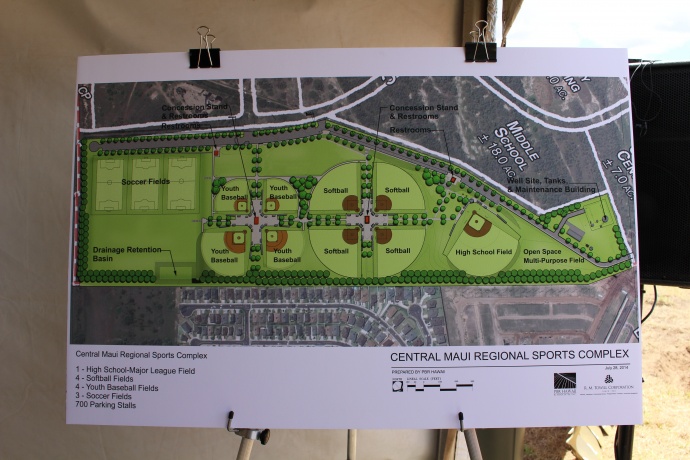Maui Lani Group Makes More Filings Against Sports Complex
By Wendy Osher
Attorneys for the nonprofit Maui Lani Neighbors, Inc. filed additional complaints against state, county and federal agencies over the Central Maui Regional Sports Complex, currently under construction in Waikapū.
The group wrote letters to the State Historic Preservation Division, the county planning director, the Federal Aviation Administration and the US Fish and Wildlife Service last week; and filed a petition with the Maui Planning Commission, seeking similar action outlined in the lawsuit the group filed earlier this month.
The suit, filed on Sept. 2, seeks injunctive relief claiming the 65-acre facility violates zoning laws. A hearing has since been set for Oct. 15.
The complaint described the parcel as a “narrow piece of land” saying it is “inappropriate” for this regional park use, especially since the Maui County Council identified a separate 209 acre parcel further south from the sports complex, for use as park space.
In its new set of letters, the Maui Lani Neighbors group alleges failure to: properly identify the property on a required archaeological monitoring plan; develop the property consistent with representations made by the state Land Use Commission; comply with conditions relating to retention basins planned for the property; and obtain an approved mitigation plan dealing with the loss of critical habitat for the endangered Blackburn’s sphinx moth.
“In light of what we’ve uncovered so far, we’re stunned that DLNR would proceed,” said Maui Lani homeowner and MLN President David Potter in an organization press release today. “This has been a real wake up call for us,” said Maui Lani homeowner and MLN board member, Kela Gannon. He continued, “You just can’t assume that state will follow the law.”
A groundbreaking ceremony for the project was conducted on July 31 at the 65-acre parcel. Plans call for the construction of a high school baseball field, two softball fields, comfort stations, a concession stand, parking, landscaping, an irrigation well, and storage tank. Phase 1 of the project will cost approximately $14.8 million, with an additional $5 million appropriated in fiscal year 2015 for future phases of the park.
During the event a small group of protesters holding two hand-made banners stood in opposition to the project claiming it was illegal. Dignitaries who spoke at the event addressed the protesters with a commitment to continue to address concerns raised.
Construction for phase 1 of the project started on Sept. 2, 2014.









